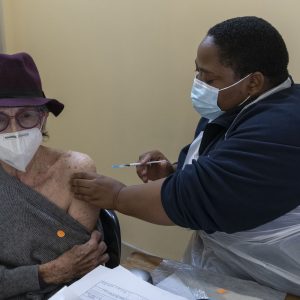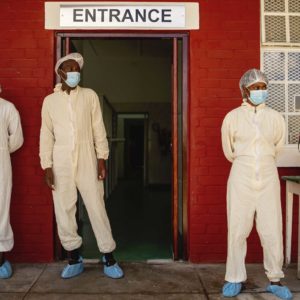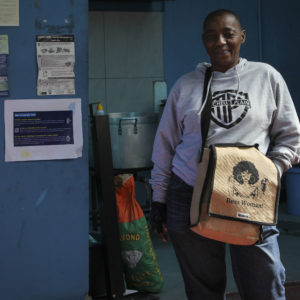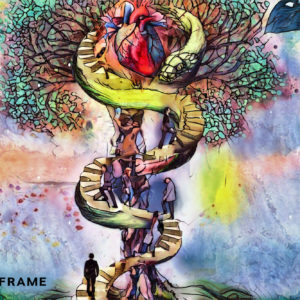Disinformation and rumours drive vaccination fears
Conversations with ordinary South Africans of all ages reveal a widespread distrust in the efficacy of the Covid-19 vaccines and the real need for accurate information.
Author:
10 December 2021

With the number of Covid-19 cases in South Africa showing a dramatic increase over the past few weeks, Minister of Health Joe Phaahla confirmed in a virtual media briefing on 3 December that the new Omicron variant was behind this surge. He said it was highly transmissible and even infected people who are vaccinated, but pointed out that those admitted to hospital are largely unvaccinated.
This is not surprising and has been confirmed by various studies. Discovery Health, for example, analysed 526 516 pathology test results, 14 673 Covid-19 admissions and 3 441 Covid-19 deaths that took place between 17 May and 23 September. The findings highlighted that the two-dose Pfizer vaccine was 92% effective in reducing hospital admission risk and 94% effective in preventing the risk of a Covid-related death.
In an effort to get more people vaccinated, the government launched its third Vooma vaccination week from 3 to 10 December. Leaders from business, churches and labour formations were asked to actively participate in this campaign by encouraging their constituencies to comply. Yet, by 8 December, the number of completed vaccinations showed that just 25.24% of the adult population – individuals 18 and older – had been fully vaccinated.
Related article:
This poses the question why many South Africans remain reluctant to get their jabs.
In Wolvenkop in Mpumalanga, just across the border with Gauteng, three pensioners, two women and a man, are using snuff in the shade of an RDP house. All of them have received their first jabs, they confirm, but they do not want to get the second doses. “They keep on saying get vaccinated, yet there are a lot of people that we know who have died after getting the second jab,” claims one woman.
“You see, you are killing us,” accuses the other one, who complains of old age-related chest pain and sore knees. “We are very scared to get our second jabs,” she says. “However, we will go to get our second jabs once we’ve enquired and are satisfied that the vaccine is not the one responsible for the death of the other pensioners.”
They refuse to say how many people have died and how they know their deaths were owing to the vaccine. “Siyathokoza, ake uzombazombe-ke (Thank you very much, now move on and speak to other people),” says the man, and the interview ends abruptly.
Unwilling and doubtful
In Sokhulumi village, about 15km away, a young woman working at Mkhambi Primary School says she felt forced to get vaccinated. “It is not like we are vaccinated because we want to do it, it is because we want to keep our jobs,” says the 22-year-old mother of a little boy.
She also has doubts about the vaccines being effective. “I really want to understand, if the vaccine boosts your immunity, why is it that some people get sick after being vaccinated and others do not make it?
“My second question is why don’t they check you before you are vaccinated? Most of us are afraid of what will happen to us when things do not go as planned. This really scares me a lot.”
Related article:
A 25-year-old mother of two children echoes that she, too, got vaccinated simply “because I do not want to lose my job”. In addition, she shows distrust about the cause of the fourth wave that is now in full swing, especially in Gauteng, its epicentre.
“We were notified that the fourth wave was coming in October. It was postponed to November, but it ended up not coming because there was an election. After the election, now we see that the fourth wave is here. We just don’t understand if this Covid-19 thing is for real, or something that is planned,” she says.
The spokesperson of the Department of Health, Foster Mohale, is quick to refute this. “The Covid-19 wave, just like the [Omicron] variant, is not decided by the government, but by a number of factors including the rate of infection, hospitalisations, mortality rates, etcetera.”
More education needed
A group of young men join the conversation at the school. “It is not like you are [really] afraid,” one of them weighs in. “You are paranoid because of the rumours that you hear on social media. Am I lying?”
Another man interjects, claiming that “this thing of being vaccinated is a myth”. But he is quickly challenged by the speaker he interrupted. “No, as much as there is an increment of positive cases, people do not get to be hospitalised because of the vaccine. The government needs to educate people more about vaccines and how they work, and make people aware that it is safe to take the vaccine.”
However, Mohale says the government is doing exactly that. “The government … has been working on a number of awareness campaigns through a number of platforms, including regular webinars, mainstream social media programmes and the distribution of daily messages to educate and unpack specific issues and counter fake news.”
He adds that disinformation is the biggest “barrier for our people to receive this life-saving treatment, which is the most effective weapon against Covid-19 pandemic”.
Related article:
This assertion certainly applies to two food vendors encountered in Bronkhorstspruit, about 50km east of Pretoria. Mother of three Kedibone Mogashane, 31, and Dineo Khumalo, 25, a mother of a four-year-old son, say they are unvaccinated because they have seen and heard of many people who died after being vaccinated.
Asked if she will let her 13-year-old daughter get vaccinated, Mogashane replies: “Never. I cannot afford to lose my child. I am scared. Even my mother [who is] 66 has never vaccinated, especially after she heard from other old people that they were sick after coming back from being vaccinated.”
Mogashane adds that two paramedics, who apparently died a week after being vaccinated, advised her husband not to get the jab. But later, paramedics in Bronkhorstspruit Hospital dismiss the story, saying they have not lost any colleagues in the past three years, nor have they heard of any in the Tshwane metro who died after being vaccinated.
Impact of side effects
Meanwhile, Jackson Masombuka, 44, who works as a gardener and has hypertension, has joined the conversation with Khumalo and Mogashane. He is fully vaccinated with two Pfizer doses.
“The first jab made me sleep while I was at work, because I experienced a headache. The second one, my entire body from the side where they injected me … wasn’t working,” Masombuka says. While he is talking, Khumalo and Mogashane interject, saying “these vaccines kill”.
But Masombuka dismisses this. “The reason I decided to get vaccinated is because one time I had experienced a very severe flu that nearly killed me. I would definitely encourage people to get vaccinated … so that we can go back to a state of normalcy.”
A teacher from Baweze Primary School who joins the group agrees with Masombuka. “Vaccines do not just kill a person. It happens usually when the person has had the symptoms and stayed for too long without being treated as they think they have the flu,” she says. “For example, one of my sisters who was a teacher in KwaMhlanga died after being vaccinated, because she was not aware that she is positive for Covid-19.”
Related article:
The mother of four children says she told her two eldest, who are 17 and 13, to get vaccinated. “But I cannot force them. The only thing that I can do is to educate them about vaccines.”
In Dark City, about 67km east of Pretoria, husband and father of two Petros Mahlangu, 58, says he is the only one in the family who is not vaccinated. “The reason I took so long to get vaccinated is because I needed to assess carefully if the vaccines are safe,” he says. But now, under pressure from his employer, he is about to get his jab.
Companies and universities have seemed to lead the way in getting their employees and students vaccinated. But, as Mohale says, all South Africans should heed the call. “It is our collective responsibility as individuals, families, employers, communities and society to protect ourselves and our loved ones. Thus, we need all hands on deck to win the battle against this ever-mutating, fast-spreading, deadly virus.”




